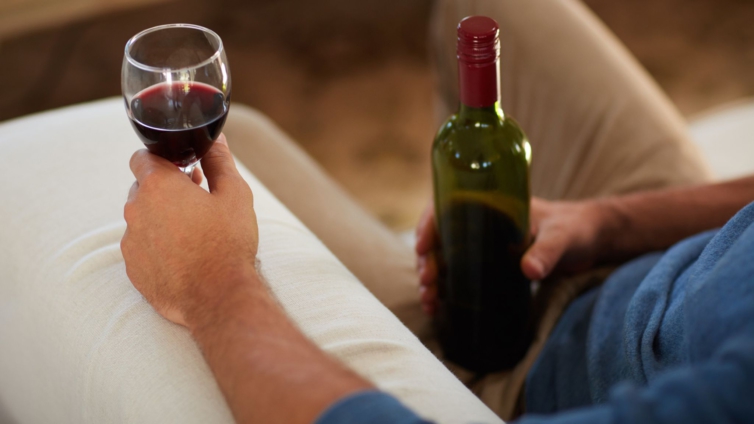The number of people drinking at high-risk levels has almost doubled since just before the UK's lockdown, experts have warned.
An estimated 8.4 million people drank "high-risk" amounts of alcohol in June, compared to 4.8 million people four months earlier, the Royal College of Psychiatrists (RCP) said.
The college has raised concerns that many addiction services would be unable to treat the "huge numbers" of high-risk drinkers after being "starved of funding" for years.
Dr Adrian James, the RCP's president, said the government needed to commit "substantial" investment in public health to prevent more lives from being "needlessly lost" to addiction.

A report by the college has called on ministers to reverse cuts and help local authorities work towards investing £374m into adult services to address the increased need for treatment.
Dr James said: "Addiction services have been starved of funding in recent years meaning many are not able to treat and care for the huge numbers of people who are drinking at high risk.
"More lives will be needlessly lost to addiction unless the government acts now and commits to substantial investment in public health, including adult addiction services, in the spending review.
Professor Julia Sinclair, chair of the RCP's addictions faculty, said COVID-19 had shown "just how stretched, under-resourced and ill-equipped addiction services are to treat the growing numbers of vulnerable people living with this complex illness".
She added: "There are now only five NHS inpatient units in the country and no resource anywhere in my region to admit people who are alcohol dependent with co-existing mental illness.

"Drug-related deaths and alcohol-related hospital admissions were already at all-time highs before COVID-19. I fear that unless the government acts quickly we will see these numbers rise exponentially."
The NHS says both men and women are advised not to regularly drink more than 14 units a week.
One unit of alcohol is about half a pint of beer or a single measure (25ml) of spirits, while a small glass of wine contains about 1.5 units of alcohol.
The British Medical Association's mental health policy lead, Dr Andrew Molodynski, said the college's analysis of the figures was "alarming" but "unfortunately not surprising".
He described the rise in people facing addiction problems, coupled with a lack of adequate services, as "a very dangerous combination" and called for "urgent intervention".
Mr Molodynski said: "Specific funding must be allocated to local authorities who have sustained years of cuts, to enable them to substantially increase spending on public mental health.
Lockdown and self-isolation have been undeniably difficult for our mental health. Some of our most vulnerable patients have suffered the most - read the blog from Dr Andrew Molodynski on why the Govt must take action now on the looming mental health crisis https://t.co/ergew4YVfM
— The BMA (@TheBMA) August 13, 2020
"Now more than ever, it is crucial that some of this is directed towards substance abuse services as the impact of isolation along with the potential impact of job losses and economic downturn gives rise to higher dependence on substances."
A spokesman for the Department of Health and Social Care said: "We support evidence-based approaches to reduce the health-related harms of drug misuse.
"And, as part of our NHS Long Term Plan, alcohol care teams will be introduced in hospitals where alcohol-related admissions are high, intervening in 50,000 cases over five years to reduce harm."
Latest Stories
-
Africa Food Systems Parliamentary Network urges governments to increase investment in agriculture
26 minutes -
AU and partners urge youth to get involved in efforts to transform continent’s food systems
33 minutes -
Fire kills 3-year-old at Asawase-Dagomba Line in Ashanti Region
1 hour -
Paskal A.B. Rois: How Mahama inspires me
1 hour -
Complete abandoned projects in Akatsi North District – Chiefs to Mahama
1 hour -
Painter and sculptor B. Acheampong turning his passion for art into profitable venture
2 hours -
Presidential lodge, RM residency in Ashanti region left to rot away
3 hours -
Herty Corgie highlights the essence of gratefulness in ‘My Gratitude’
4 hours -
ANNOUNCEMENT: Joy FM temporarily goes off air January 11
5 hours -
Yango honored with two titles at the Technovation Africa Awards 2024
5 hours -
Aowin Traditional Council declares war on illegal mining with spiritual intervention
5 hours -
Leadership must ensure equity for all citizens, regardless of faith – Asiedu Nketiah
5 hours -
Prof. Alex Manu appointed Executive Director at Centre for Social Justice
5 hours -
Imminent changes within some key security agencies, state institutions, and its implications
5 hours -
There are more women than men, but there’s a man for every woman – Rev. Nana Yaa
6 hours

